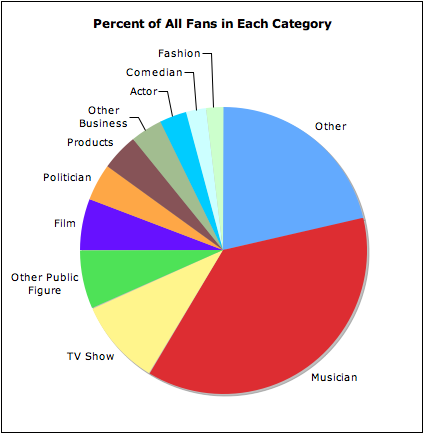Facebook Users Just Want Entertainment
Starting in late 2007 Facebook began instituting its media strategy in earnest with Facebook Pages. According to Facebook pages offer "a unique experience where users can become more deeply connected with your business or brand."
It's good to see Facebook becoming conscious about how they can help shape the future of branding, since this is where the real money is for social networks. Let's see how Facebook Pages has evolved since last November.
Factoids
I went into this project without any pre-conceptions of what I would find. I never really used Facebook pages and wasn't sure if there were any definite conclusions to be found in the data. At best I thought the numbers might be useful for third parties. Here are some interesting facts:
- As of May 18th, 2008 there are 190,365 pages and 50,800,399 fans across all pages.
- One third of all pages are dedicated to musicians, but this category represents 37% of all fans.
- After musicians the category with the second-largest number of fans is TV Shows even though it has 3.8 times fewer fans.
- 7.9% of pages are in the "other business" category, the largest business category, but only 3.6% of fans.
NOTE: Facebook changes the copy from "fans" to something type-specific. For example, politicians don't have "fans" they have "supporters." I'm going to use fan in the general sense.
It turns out that sports, entertainment, and politics are the three broad categories that perform the best on Facebook, as we'll see below.
Trends
There are two ways to measure the size of a category: one, by the number of pages in that category; two, by the number of fans in that category. Let's look at both.

The graph includes the ten largest categories by the number of pages in each, with the remaining 55 categories grouped into one. The interesting thing is that the graph is divded almost evenly into thirds, consisting of one single category (musicians), the 1-9 most common categories, and the remaining 55 categories.
This doesn't really tell us how Facebook Pages are performing by category only how people are investing in Facebook pages. Let's look at the users' side of things.

There are two things worth noting in this graph. One, the categories make a qualitative shift towards entertainment and politics and away from general businesses. Two, the graph becomes even more lop-sided, with musicians taking up almost 40% of the graph and "other" falling to around 20%.
Usage
So, here's a question: what categories fair best? Let's look at the 100 largest pages by number of fans and see how they break down by category.

The difference here is even more stark. 48% of the top 100 pages are musician pages and 17% are for TV shows. No other category has more than 10% of the fans.
Let's take a look at how pages are paying off by taking the difference between the percentage of fans in a category and the percentage of pages. All else being equal we'd expect pages different categories to have a similar "return on investment." Anything beyond that can only be explained by how Facebook users interact with pages.
That is, if 10% of all pages are in a category but 15% of all fans are in that same category, we say that category has a 5% "ROI." This metric allows us to see which categories are most likely to pay off.
| Facebook Page Categories by ROI | |||
|---|---|---|---|
| Category | % of Pages | % of Fans | ROI |
| TV Show | 1.20% | 9.65% | 8.45% |
| Film | 1.44% | 5.75% | 4.31% |
| Musician | 34.11% | 37.03% | 2.93% |
| Politician | 1.85% | 4.43% | 2.57% |
| Actor | 1.48% | 3.20% | 1.72% |
| Comedian | 0.94% | 2.02% | 1.09% |
| Game | 0.62% | 1.41% | 0.78% |
| Food and Beverage | 0.91% | 1.67% | 0.77% |
| Athlete | 0.92% | 1.65% | 0.72% |
| Sports Team | 1.37% | 1.96% | 0.59% |
| Sports / Athletics | 1.16% | 1.72% | 0.57% |
The most striking thing, for me, is how conventional these categories are: entertainment, politics, and sports.
Conclusions
Facebook's future rests in the branding of traditional media verticals. They have captured a powerful demographic and have nearly perfected a distribution mechanism. They deny they're a media company even as their VP of Product Marketing says they're the "net's cable company."
Entertainment and sports pages perform above expectations, while generic "business" pages perform below expectations. The popularity of the political categories is to be expected since Facebook's largest userbase is in the US and 2008 is a Presidential election year.
MySpace seems to understand that social networking and entertainment go hand-in-hand. It's about time Facebook embraces the same — their users already have.